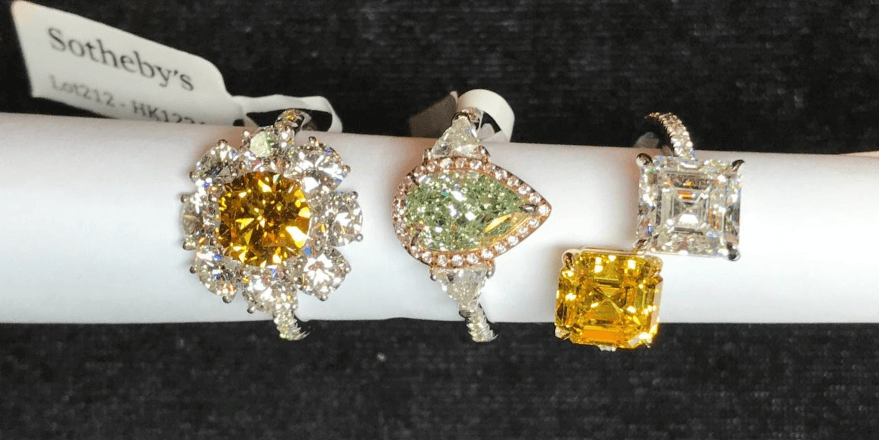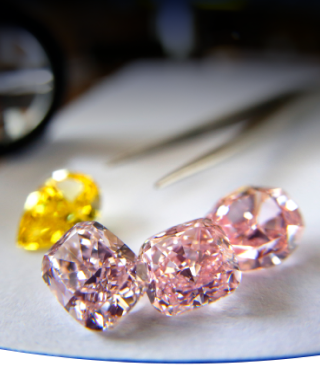Sotheby’s Hong Kong, Important Jewels February 18, 2022
As most of the industry has been unable to travel to Hong Kong during this challenging period, this auction analysis can help those who wish to bid without physically inspecting the goods.
Our Sotheby’s Hong Kong Pre-Auction Analysis focuses on elements that aren’t visible to the untrained eye. We will describe the important visual elements for those who cannot attend the preview and discuss characteristics such as Undertone, Color Dispersion, and Inner-Grade. These factors, collectively termed UDI, are explained in detail at the end of this article. We analyze and grade Fancy Color Diamonds relative to their GIA grades.
We use grades 1, 2, 3, and 4, with 1 being the lowest grade. Grade “4+” is granted in rare cases and denotes stones with exceptional characteristics. Stones that receive a minimum total UDI score of 8, without a red remark, pass the industry threshold and can be traded easily. Fancy Color Diamonds that are graded 10 or above, (without a quality remark) are usually sought after by high-end jewelry brands, collectors, and the investment community.
For your convenience, we have added direct links to the GIA reports.
- All images in this article review were taken with an iPhone 12 Pro; no filters were applied.
- All auction valuations are per-carat and are listed in US dollars.
Lot: 258
Description: 7.37 ct, Fancy Light Pink, Marquise, VVS1
High Auction Estimation: $174,098 pc
Didn’t reach the minimum
GIA Report: View
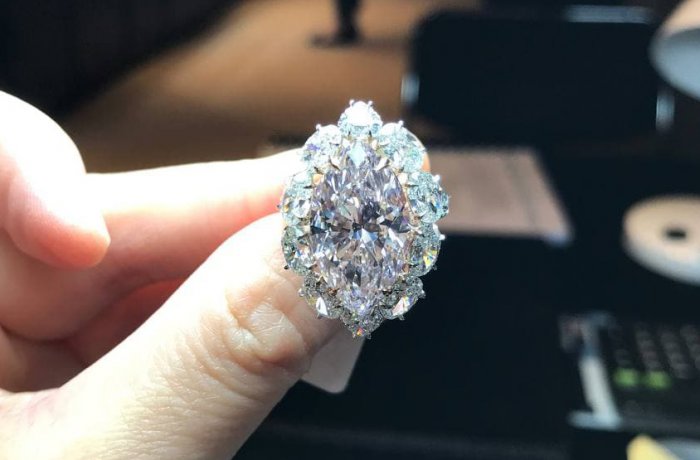
Analysis:
The small open culet and traditional facet alignment of this large Fancy Light Pink Marquise are typical characteristics of stones from the 1950s to the 1970s. This unmodified style results in a low color dispersion, leaving a low amount of color at the two opposite tips. The presence of a purple undertone is visible and creates a pleasant hue. Looking at the clarity marking on the report, it is reasonable to assume the clarity of the stone can be improved to IF.
Visual Assets:
Inner Grade Hue |
Color Dispersion |
Undertone |
Quality Remark |
|
7.37 ct,FLP, MQ, VVS1 |
3 |
2 |
4 |
Low color dispersion |
Total Visual Score 9 out of 12
Lot: 238
Description: 4.87 ct and 4.78 ct, Fancy Vivid Yellow, Brilliant-cut, VS1 and VS2 respectively
High Auction Estimation: $73,130 pc
Didn’t reach the minimum
Rarity: A similar diamond enters the market once every… Check Rarity Here
GIA Reports: View and View
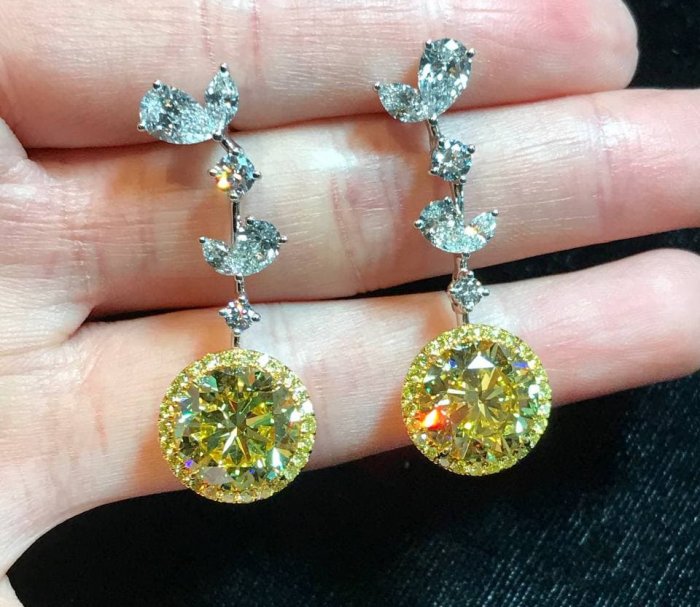
Analysis:
Two Vivid Yellow Round Brilliant-cut diamonds with a solid Inner-Grade. However, the typical color dispersion for this traditional cut, doesn’t create an impressive hue on the face up view. No significant green or brown undertone is visible in the color.
Visual Assets:
Inner Grade Hue |
Color Dispersion |
Undertone |
Quality Remark |
|
4.87 ct & 4.78 ct, FVY, ES, IF |
3 |
2 |
3 |
Low color dispersion |
Total Visual Score 8 out of 12
Lot: 255
Description: 7.36 ct, Fancy Vivid Yellow, Emerald, VS1
High Auction Estimation: $83,680 pc
Price realized: $81,029 pc
Rarity: A similar diamond enters the market once every… Check Rarity Here
GIA Report: View
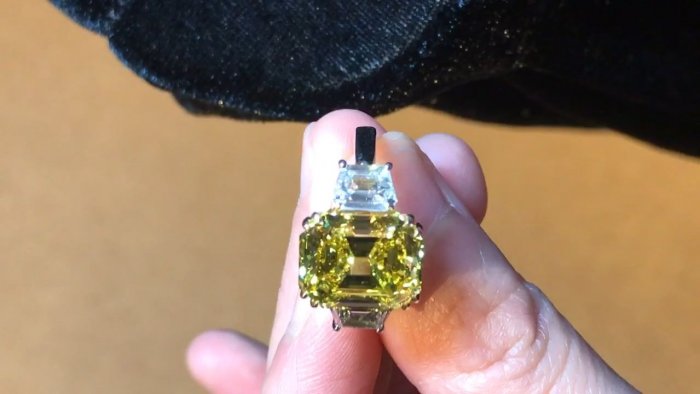
Analysis:
A Vivid Yellow Emerald-cut diamond with a strong Inner-Grade. Most of the color is concentrated in the four corners of the pavilion while the other parts of the stone have a limited amount of color. A typical look in Emerald cut diamonds. No undertone is visible in the color, which produces an absolute yellow color.
Visual Assets:
Inner Grade Hue |
Color Dispersion |
Undertone |
Quality Remark |
|
7.36 ct, FVY, ES, VS1 |
4 |
3 |
4 |
Total Visual Score 11 out of 12
Lot: 237
Description: 5.27 ct, Fancy Vivid Yellow, Emerald, IF
High Auction Estimation: $68,172 pc
Price realized: $58,236 pc
Rarity: A similar diamond enters the market once every… Check Rarity Here
GIA Report: View

Analysis:
A Vivid Yellow Emerald-cut diamond with a strong Inner-Grade. Most of the color is concentrated in the four corners of the pavilion while the other parts of the stone have a limited amount of color. A typical look in Emerald cut diamonds. No undertone is visible in the color, which produces an absolute yellow color.
Visual Assets:
Inner Grade Hue |
Color Dispersion |
Undertone |
Quality Remark |
|
5.27 ct, FVY, ES, IF |
4 |
2 |
4 |
Low color dispersion |
Total Visual Score 10 out of 12
Lot: 236
Description: 3.04 ct, Fancy Green, Oval, SI1
High Auction Estimation: $101,297 pc
Price realized: $90,330 pc
GIA Report: View
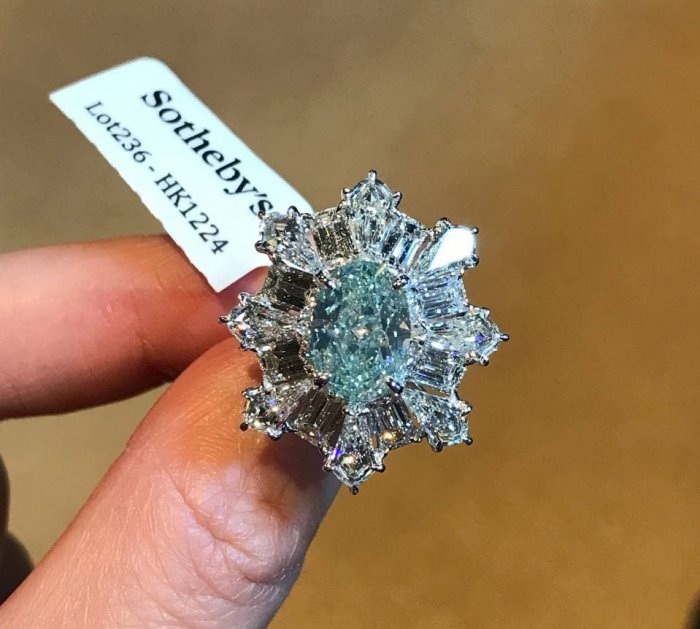
Analysis:
A Fancy Green Oval-cut diamond with a fluorescent grade of: Very Strong Blue, a feature that is visible under direct sunlight. The stone’s color dispersion is average, with several colorless patches in the crown. The GIA report makes note of green color patches in the diamond.
Visual Assets:
Inner Grade Hue |
Color Dispersion |
Undertone |
Quality Remark |
|
3.04 ct, FG, OS, SI1 |
3 |
3 |
3 |
Very strong blue fluorescent |
Total Visual Score 9 out of 12
Lot: 254
Description: 3.02 ct, Fancy Vivid Yellow, Emerald, VVS2
High Auction Estimation: $307,583 total
Didn’t reach the minimum
Rarity: A similar diamond enters the market once every… Check Rarity Here
GIA Report: View
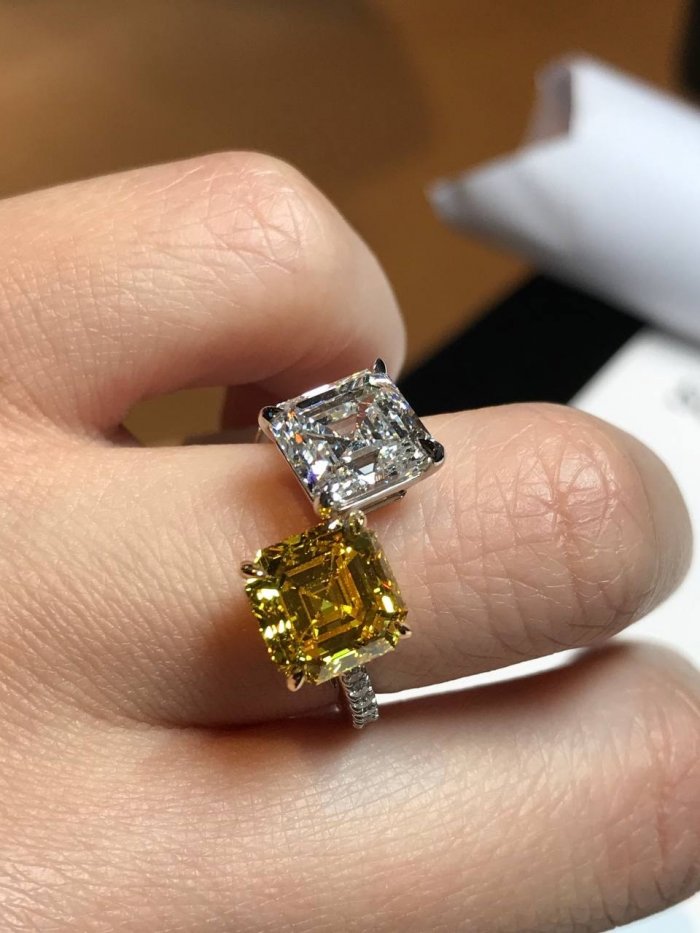
Analysis:
A Square Vivid Yellow Emerald-cut with a strong Inner-Grade and average color dispersion. No significant green or brown undertone is present in the stone’s hue.
Visual Assets:
Inner Grade Hue |
Color Dispersion |
Undertone |
Quality Remark |
|
3.02 ct, FVY, ES, VVS2 |
4 |
3 |
3 |
Total Visual Score 10 out of 12
Lot: 213
Description: 2.01 ct, Fancy Intense Yellowish-Green, Brilliant-cut, VS2
High Auction Estimation: $44,685 pc
Price realized: $40,183 pc
GIA Report: View
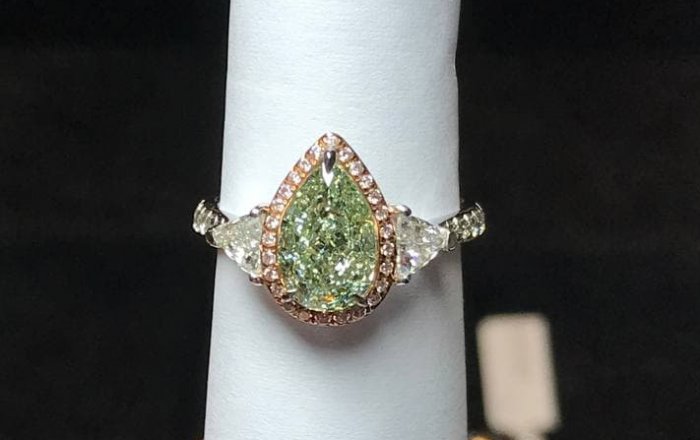
Analysis:
An Intense Yellowish-Green Pear shape with high color dispersion. The “Intense” Inner-Grade meets the expectations one would have of this saturation level. The yellow modifier is mild, and one could easily describe the diamond as green, a feature that yields a premium.
Visual Assets:
Inner Grade Hue |
Color Dispersion |
Undertone |
Quality Remark |
|
2.01 ct, FIYG, PS, VS2 |
3 |
4 |
4 |
SI2 clarity |
Total Visual Score 11 out of 12
Lot: 212
Description: 1.70 ct, Fancy Vivid Orangey-Yellow, Round Brilliant-cut (Round), SI2
High Auction Estimation: 37,738$ pc
Didn’t reach the minimum
GIA Report: View
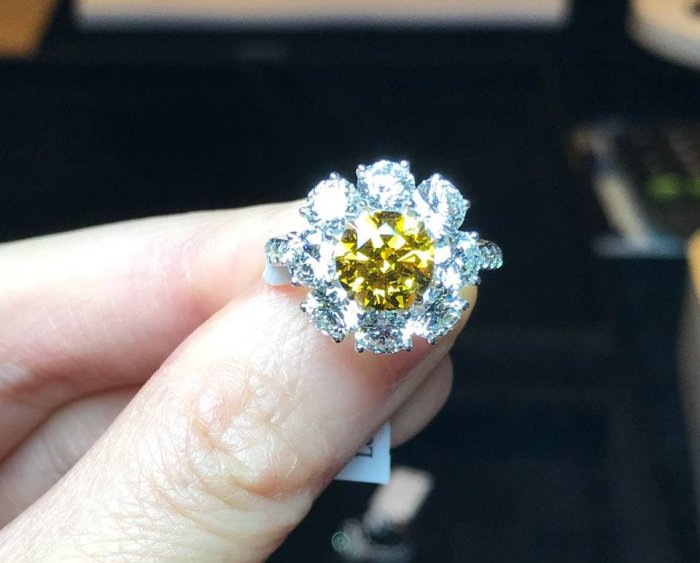
Analysis:
According to the GIA report, the stone has ~15% orange and ~85% yellow in its color mix. The stone’s clarity is graded as SI2 with large inclusion under the table. The Inner-Grade is high and no brown undertone is visible in the hue.
Visual Assets:
Inner Grade Hue |
Color Dispersion |
Undertone |
Quality Remark |
|
1.70 ct, FVOY, BCRS, S12 |
4 |
3 |
3 |
SI2 clarity |
Total Visual Score 10 out of 12
General
We use 1, 2, 3, 4, and 4+ to grade the three visual elements that GIA is silent about, although they dramatically impact a diamond’s value.
Inner-Grade refers to the strength of color within each GIA saturation category:
Grade 1 weakest, bordering the saturation below.
Grade 2 weak (most common).
Grade 3 full-bodied color (above average).
Grade 4 very strong saturation.
Grade 4+ applies to the Vivid category only, exhibiting the strongest possible saturation (rarely seen).
Undertone refers to a subtle hue influence in the body color of the stone.
For example:
A Fancy Blue Diamond with a significant gray presence in its general appearance will be graded with a low undertone grade of 1. A Fancy Blue with no gray influence that is close to a primary blue will receive a grade of 4.
In Pink Fancy Color Diamonds, a stone with a warm undertone (such as orange or brown) will receive a low undertone grade. A pink stone with a cold undertone (such as purple) will receive a high grade.
In Yellow Fancy Color Diamonds, low foreign influence or a light orange influence will grant the stone a high undertone grade. When the yellow undertone looks like a true primary yellow, it will receive the rare grade of 4+. Green and brown undertones will grant the stone a low grade in the yellow category.
Color Dispersion relates to how well the color is dispersed in the face-up view of a Fancy Color Diamond, regardless as to whether the GIA grades the stone as even. A stone with many colorless areas will receive a grade of 1, while a stone that exhibits no colorless patches in its face-up view will receive a grade of 4+. Unlike the first two elements, color dispersion is not a gemological quality and is the result of cutter proficiency.
